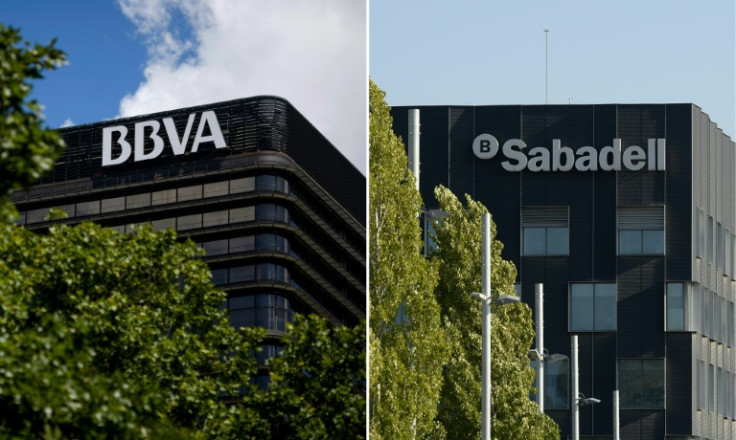Spain Vows To Block BBVA's Hostile Bid For Rival Bank

Spain's second-largest bank BBVA announced Thursday a hostile takeover bid for smaller rival Banco Sabadell but the government vowed to block the move, which would create a European giant in the sector.
BBVA's new bid came three days after Sabadell's board of directors rejected a merger proposal, saying it was "not in the best interest" of the bank.
The takeover proposal values Sabadell, Spain's fourth-largest banking group in terms of capitalization, at nearly 11.5 billion euros ($12.3 billion).
"The operation will create one of the best banks in Europe," BBVA said in a statement.
The takeover would be carried out under same conditions as the initial approach -- an exchange of one new BBVA share for every 4.83 Sabadell shares, a 30-percent premium over the April 29 closing price of both banks, BBVA said.
"We are presenting to Banco Sabadell's shareholders an extraordinarily attractive offer to create a bank with greater scale in one of our most important markets," BBVA Chair Carlos Torres Vila said in the statement.
A takeover would create a banking powerhouse capable of competing with Santander -- Spain's leading bank -- as well as with European giants such as HSBC and BNP Paribas.
But Prime Minister Pedro Sanchez's leftist government swiftly came out against the move, as did the regional government of Catalonia where Sabadell was born and where it has a strong presence.
Labor Minister Yolanda Diaz said it was against Spain's "interests" because it "would destroy many jobs".
Economy Minister Carlos Cuerpo warned the government "will have the last word when it comes to authorizing the operation".
The head of the regional government of Catalonia, Pere Aragones, echoed these concerns, telling Spanish public television the takoever would "affect many jobs in Catalonia".
Aragones is facing a regional election in Catalonia on Sunday, with polls showing he is trailing.
BBVA, which also has operations in Mexico, Argentina and Turkey, is Spain's second-largest banking group in terms of capitalisation and has 74.1 million customers.
Sabadell operates in 14 countries and has nearly 20 million customers.
The bank had said on Monday that the initial offer "significantly undervalues the potential of Banco Sabadell and its standalone growth prospects".
It also pointed to the recent "decline and volatility in the BBVA share price" which reflected "the uncertainty around the value of the proposal".
BBVA then informed Sabadell in a letter that it had "no room" to improve its offer, which it considered generous.
Shares in Sabadell were up by around four percent in mid-morning trading, while BBVA fell by nearly six percent.
The two banks had initially announced a plan to merge in November 2020 with the aim of better weathering the economic crisis triggered by the Covid-19 pandemic.
But it was scrapped just 10 days later, with Sabadell saying that BBVA's offer did not reflect the real value of its business.
In the ensuing months, Sabadell undertook a major restructuring plan to slash costs that resulted in 1,800 redundancies, with BBVA going through a similar process, shedding 3,000 jobs.
Both have since recovered as has the wider Spanish banking sector which posted record profits in recent months, despite an exceptional windfall tax imposed by Spain's left-wing government to help households cope with soaring consumer prices.
BBVA posted a 19 percent rise in first-quarter net profits to 2.2 billion euros ($2.3 billion).
Sabadell recorded first-quarter net profits of 308 million euros, its highest ever quarterly figure, up 50 percent from a year ago.
Spain's banking sector underwent a first wave of consolidation during the 2008 global financial crisis, with the collapse of provincial savings banks which were absorbed by the bigger players.
It underwent further consolidation in 2021 when Caixabank took over Bankia, creating Spain's third largest banking group, which was followed by Unicaja's acquisition of Liberbank creating Spain's fifth biggest domestic lender.
© Copyright AFP 2025. All rights reserved.




















